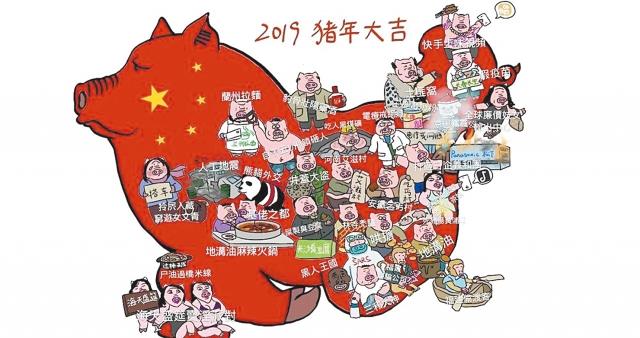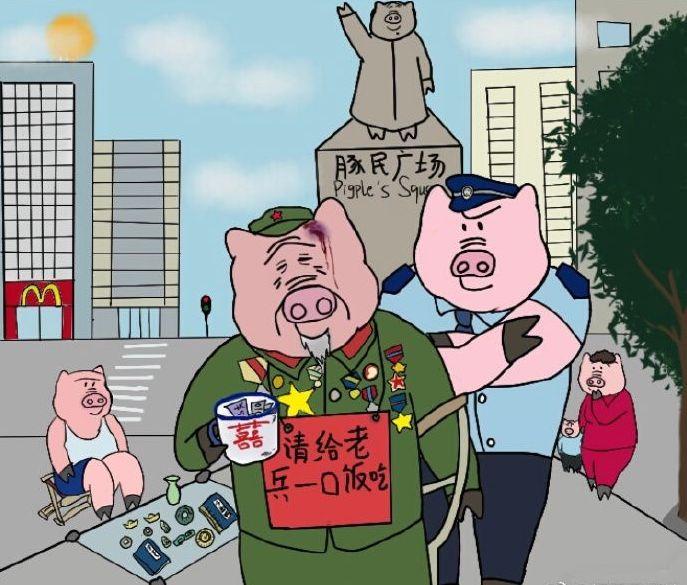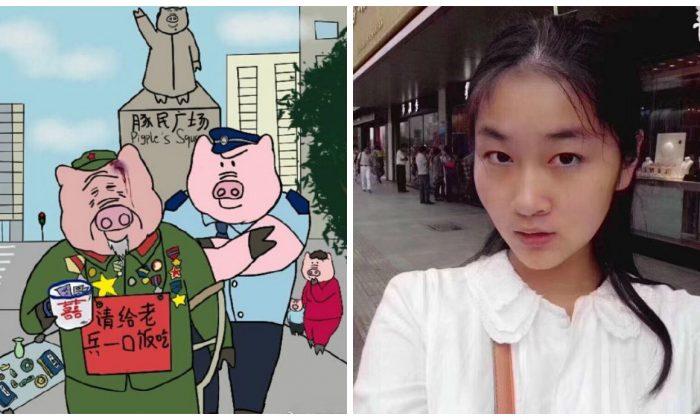In China, lacking a nationalist spirit has become the latest crime, as the story of a 22-year-old college graduate attests.
Zhang Dongning has taken to using Japanese-style caricatures to depict trending social issues. Over the past two years, the cartoonist from Anhui Province has produced a pig-themed series of over 300 satirical cartoons, depicting trends such as the traditional Han couture craze, veterans demanding their unpaid retirement benefits, and Chinese tourists’ Thailand buffet frenzy. All Chinese characters in the artworks appear pig-headed, and she names them “pigple.”
Ahead of New Year’s Day, when China officially transitioned into the Year of the Pig, Zhang posted another pig-themed caricature “celebrating” the occasion: a map of China in the shape of a grim-faced, prostrated pig, vermilion in color, on which various pig-headed figures pop up protesting the recent scandals across China. Five yellow stars appear prominently on the top left corner, referencing the flag of communist China.

Authorities Take Issue
On July 28, local authorities in Tianjia’an, a branch of the Huainan Public Security Bureau, announced that Zhang had been arrested for being “Jingri” and insulting China. Literally translated as “Japanese in spirit,” the term “Jingri” became popular among mainland Chinese last year as a somewhat derogatory reference to Chinese nationals who identify themselves more with Japan than their own country.The police accused Zhang of “insulting Chinese people’s image, intentionally distorting China’s historical facts, and misinterpreting trending news in China and overseas,” according to the statement.
“[The cartoons] had seriously hurt Chinese feelings and trampled on national dignity, the impact on society was very damaging,” the statement read, adding that the officials decided to arrest Zhang to prevent “future criminal activities” and “clean up internet space.”
The statement also said that the police had launched a probe in October 2018 after the “insulting-China” cartoon series came to their attention.
On the same day as the announcement, police from five other regions in the country also announced the arrest of eight other so-called “pro-Japanese” individuals, including someone surnamed Lu who allegedly colluded with Zhang. Both had seen their accounts on Weibo, the Twitter-like platform where they circulated the cartoons, deactivated by the police.

Netizens Speak Out
The jailing of the young cartoonist has sparked outrage across China’s internet. Critics have attributed Zhang’s arrest to an intensifying censorship campaign online and in the media being drummed up as the Chinese Communist Party prepares for the 70th anniversary of the regime’s founding.Nie Chenxi, the vice director of China’s Publicity Department in charge of disseminating propaganda, has issued directives asking local offices to “stand on political high ground to modulate every television episode, every documentary, and every cartoon,” and be watchful “every second” for anything that deviates from the “official main theme” or “sensitive topics,” state media reported.
“What’s wrong with Zhang Dongning doing a pig-themed cartoon series? It’s the Year of the Pig, and many families have affectionately called their newborns ‘baby piggy,’” investigative journalist Gao Yu said in Zhang’s defense. A prominent dissident herself, Gao had once been detained for seven years for her reporting on China’s elite-circle politics.
Some internet users said that they identified with what Zhang portrayed and questioned the validity of the so-called crime.
“What kind of crime is being ‘Japanese in spirit,’ can the officials please come out and give an explanation?” one person wrote on Weibo. “The criminal law needs to make space for dozens of blanks for the new criminal charges.”
No Legal Basis
Several Chinese lawyers also wrote analyses further refuting the authorities’ claims.“For insulting charges, the target of the crimes can only be individuals and not a group, there needs to be specific victims,” Shandong lawyer Fu Wen wrote in an article on Weibo. “For this case, if there is any victim, it would be all Chinese people, but there’s a question of whether every Chinese person would think that their personal dignity and reputation have been harmed.”
Beijing-based lawyer Zang Qiyu has publicly announced on Weibo that he was willing to defend Zhang free of charge.
The lawyer said that neither “insulting China,” nor being “spiritually Japanese,” constitute a criminal offense.
“It’s a cartoon rendition of a real-life situation,” Zang told Inkstone. “If you charge Zhang for insulting the dignity and reputation of all Chinese, that would not work. For one, I’m not insulted by her work. And I’m Chinese.”






Friends Read Free